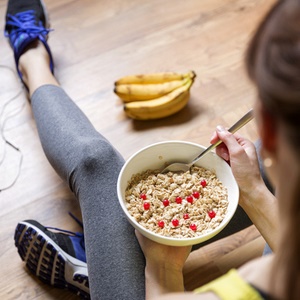
When you get up before dawn to crush your morning workout, it’s easy to forget about food — especially if you have a snooze button habit that gives you just minutes to get out the door. (Girl, I’ve been there.) The other problem: For some people, the thought of stomaching food right out of bed — and just before a major sweat sesh — seems less than appetising.
Still, there are definitely benefits to fuelling your body before banging out a few kays or a solid strength workout. Luckily, nutritionists are here to help you figure out how and when to eat so you can crush your workouts every time (you know, without feeling like you’re going to vom).
Do I need to eat before my morning workout?
It will likely help your performance, though it does depend on a few factors including: your individual needs, the type of exercise you’re going to do, your ability to digest food, and if you have time to eat afterward, says registered dietician and personal trainer Mary Jane Detroyer.
“Your body’s supply of glucose is severely depleted after a night of sleep, so there’s little glucose left to fuel a morning workout. Unless you restore your glucose supply, you’re more likely to feel sluggish and fatigued sooner,” says registered dietician Torey Armul.
First, consider how long you’ll exercise. Detroyer says it’s a good idea to squeeze in a snack if you’re going to sweat for more than 30 minutes. Armul adds that if your morning workout is intense (think: HIIT, swimming or spinning) or lasts longer than 45 minutes, it’s even more important to eat something beforehand.
But what about the concept of ‘fasted cardio’?
You might have heard of fasted cardio a.k.a. doing an aerobic workout in the morning without have any food beforehand. And while that might work for some people, if you’re looking to push your body, that’s probably not your best bet.
“Some people consider exercising in a fasted state the ‘fat burning zone,’ because the body turns to fat for fuel when glucose is not sufficient,” says Armul. “However, fat is converted to energy more slowly, so you’ll likely feel more fatigue and less energy and intensity during your workout.”
READ MORE: 21 Amazing Protein Sources That Aren’t Meat (And Taste Great)
So, what should I eat if I do need fuel?
Go for simple carbohydrates that digest quickly and easily, plus a small amount of protein and fat for a little substance, says Armul.
If you can stomach only a small snack, try: toast with peanut butter, cheese with crackers, a smoothie (fruit, milk of your choice, half a scoop of protein powder) or a piece of fruit.
If you want more of a meal: oats, peanut butter and jam sandwich, wholegrain cereal (with milk and fruit) or an egg sandwich.
Keep in mind, carbs are the most important factor to fuel your workout and keep your energy up while you sprint or crank out strength reps, says Detroyer. “You use protein afterward for muscle repair,” she says.
READ MORE: 10 Ways To Make Your Switch To Veganism A Whole Lot Easier
Do I need to wait after eating to start my workout?
That depends on how well you digest the food, says Detroyer. If you feel okay to start exercising right after you eat, go for it. But if your stomach tends to feel sensitive mid-sweat, you might consider waiting for an hour or two before your workout. If you don’t have that time to spare, try a smaller meal.
To play it safe, though, go for simple carbs (think: a banana or peanut butter toast) — most people can tolerate them without nasty stomach pains, says Armul. If you have a meal with lots of protein and fat — nutrients that digest slower — it can lead to bloating and cramping.
“Observe what goes on and how your body feels during the workout,” Detroyer says. Ask yourself: Am I stronger? Do I have more energy? Am I experiencing cramping? It might take a few tries to figure out what’s best for your body.
READ MORE: 9 Foods That Can Actually Lower Cholesterol Naturally
What should I eat after I’m done with my workout?
You still need carbohydrates after your workout, but protein is the most important nutrient for muscle recovery and repair, says Armul. Aim for 10 grams of protein within 30 minutes of strenuous exercise, and another 10 within two hours after that.
Detroyer suggests bringing a post-sweat snack or meal with you so you eat it right after your sweat sesh. The same intensity and duration rule applies after your workout as it did for your pre-workout fuel: If you only did 30 minutes of exercise at a low to moderate intensity, it’s less important to eat than if you had a tough session for 45 minutes to an hour.
Need some guidance? Try these smart post-workout foods:
- Chocolate milk
- Nuts, like almonds, cashews or pistachios
- Cottage cheese
- Greek yoghurt
- A hard-boiled egg and fruit
- A smoothie with a full scoop of protein
- A protein bar
- One serving of turkey
- Cheese with a piece of fruit
- And don’t forget about water!
“Hydration is just as important as fuelling,” says Detroyer. “When you get up in the morning, aim to have 500ml of water before you go to the gym. And bring a bottle with you.” Just like that: You’re set for a successful morning sweat.
This article was originally published on www.womenshealthsa.co.za
Image credit: iStock




 Publications
Publications
 Partners
Partners










